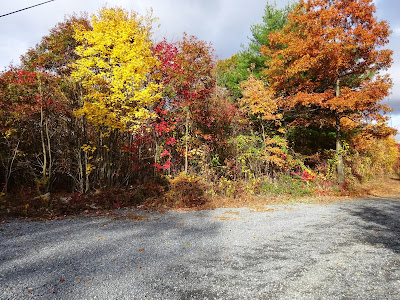When we were younger and had a passel of children at home, we had an annual tradition of going on a hike when the leaves were colored in the fall. This was usually around our daughter's October 19 birthday. We hiked parts of the Appalachian Trail or other places in Penn's Woods.
We ran out of children and ambition and dropped the tradition many years ago. But on Sunday the leaves were at their peak and the colors were more brilliant than some years. I got the urge once again to go out and enjoy the glory of autumn. I thought we could just take a drive rather than hike but that turned out not to be satisfactory. To really see and fully appreciate fall leaves, you have to get up close to them. So we parked the car in a parking lot on the Blue Mountain and walked some trails.
The bright sunshine brought out the full colors of the leaves and the smell of the fallen ones can only be appreciated while walking in the woods. I thoroughly enjoyed the experience but there was something lacking with just the two of us. There was no one to run ahead or lag behind poking sticks in hollow logs, picking up the perfect walking stick, collecting handfuls of leaves or other woodland treasures, saying, "I have to go to the bathroom," or "Mom, he hit me with his stick." When hiking was a family activity I never thought I'd miss that kind of thing, but I did. We walked sedately along snapping pictures and stayed out as long as the light lasted. It was nice but I missed the company of the children who have disappeared into adults.
We wound up at Bloody Springs where the Spatz family were killed by Indians during the French and Indian War. They lived near the spring, which was renamed Bloody Spring after the attack. This is not far from where the Hostettler family lived and whose story of the Indian attack they suffered in 1757 is well-known. Not many details seem to be available on the Spatz family and their story. Whether it is fact or fancy I cannot confirm but it certainly was a distinct possibility. The Blue Mountain was the dividing line between the frontier and Indian territory. The Hostettlers lived at the foot of the mountain but this spot is part way up the mountain. Being too close to Indian territory made them easy targets.
This monument has been erected to mark the spot. The spring has been reduced to a trickle but is still there.
Penn's Woods has changed so much it's hard to imagine what it was like to live here 250 years ago. Time moves relentlessly on. Children grow up, trees disappear, leaves fall---the cycle repeats year after year. The changes come in such small increments they are hardly noticeable. But one day you look back, see how much things have changed, and wonder how it happened so fast.










